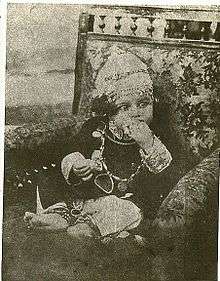Bahadur Yar Jung
Nawab Bahadur Yar Jung (or Bahadur Yar Jang) (3 February 1905, Hyderabad – 25 June 1944) (Urdu: بہادر یار جنگ) was a foremost Muslim leader in the princely state of Hyderabad in British India. He founded the branches of Khaksars in Hyderabad and was known as a powerful religious preacher. In 1938, he was elected the President of Majlis-e-Ittehadul Muslimeen, a position in which he served till his death.[1][2][3]
Bahadur Yar Jung بہادر یار جنگ | |
|---|---|
 | |
| Born | Muhammad Bahadur Khan 3 February 1905 Hyderabad, Hyderabad Deccan |
| Died | 25 June 1944 (aged 39) Hyderabad, Hyderabad Deccan |
| Cause of death | Suspected poisoned; his 'hukka' (water pipe) was poisoned when he went to meet the opposition party. |
| Resting place | Hyderabad, India |
| Nationality | British India |
| Other names | Quaid-e-Millat, Bahadur Yar Jung |
| Alma mater | Madarsay Darul-Uloom, now called City College Hyderabad |
| Known for | Prominent figure of Pakistan Movement, who propounded the philosophy of Sharia Law and Muslim State. Associated with: Majlis-e-Ittehadul Muslimeen Muslim League Khaksar Tehrik |
| Political party | Majlis-e-Ittehadul Muslimeen Muslim League Khaksar Tehrik |
| Spouse(s) | Talmain Khatoon |
| Parent(s) | Khatoon (mother) Nawab Naseeb Yar Jung (father) |
Career

Bahadur Yar Jung wanted his own princely home state, Hyderabad, to be separate from the rest of India as a Islamic/Muslim state with Sharia Law in force. He led an organisation called Majlis-e-Ittehadul Muslimeen, for the propagation of Islam. A friend and aid to Mohammed Iqbal and Muhammad Ali Jinnah, he was one of the most admired leaders of the Pakistan Movement. In 1926, Bahadur Yar Jung was elected president of the Society of Mahdavis. In 1927, he led an organisation called Majlis-e-Ittehadul Muslimeen, of which he was the founder member. In 1930, he was elected secretary of the Union of Jagirdars which had been established in 1892 but was moribund. A great Muslim zealot, he advocated peaceful but separate and independent co-existence among people of different religions after the independence of British India. So he vigorously supported All India Muslim League and the Pakistan Movement. He was closely associated with both Allama Iqbal and Muhammad Ali Jinnah. He was a great author and a devoted Muslim.[2][4][3]

Oratory
Matched by very few, his oratory skills served as a catalyst to the independence struggle of British India.[4] On 26 December 1943, he delivered an important speech in the All India Muslim League Conference. In the first half of his speech he laid stress on the struggle for Pakistan. In the second half he talked about the creation of Pakistan. At the end he said,
- "Muslims! Decisions made under pressure do not last for long. To-day we are not in need of a tree that blooms like a flower or in need of fruit that tastes sweet to our mouths. Instead, we are in the need of fine manure that dissolves in the soil and strengthens the roots. That will unite with the water and soil to produce beautiful flowers. That will destroy itself but will leave its scent and taste in the flowers. We are at present not in need of beautiful scenery that looks good to the eyes, but what we need are foundation stones that will bury themselves in the soil to make the building standing on them strong."[5]
Personal life
He was the son of Nawab Naseeb Yar Jung, a prominent resident of Hyderabad. His wife's name was Talmain Khatoon. He had two brothers by name Nawab Mohammed Mandoor Khan Sandozai and Nawab Mohammed Doulath Khan Sandozai. Nawab Mohammed Mandoor Khan sons were (Nawab Mohammed Naseeb Khan, Nawab Mohammed Bahadur Khan & Nawab Mohammed Adli Khan). Nawab Mohammed Doulath Khan had 5 daughters, one of her daughter was given in marriage to Dr. Moinuddin Khan Sandozai, a doctor practising in Hyderabad, India. Their daughter, Uzma, was given in marriage to Ahmed Alam Khan, one of the seven sons of Shah Alam Khan, owner of Hyderabad Deccan Cigarette Factory. In December 2019, Uzma's only son, Barkat Alam Khan, married Qudsia, the eldest daughter of Asaduddin Owaisi, at an extremely lavish ceremony in Hyderabad, India.
Commemorations
- Bahadurabad, a neighbourhood of Karachi, Sindh, Pakistan, is named after Bahadur Yar Jung.[6]
- City of Karachi, Pakistan also has Bahadur Yar Jung Library and Bahadur Yar Jung Academy named after him.[3]
- In 1990, Pakistan Post issued a postage stamp depicting him in its 'Pioneers of Freedom' series designed by Saeed Akhtar.[7][8]
See also
- Hyderabad State
- Muslim League
- Majlis-e-Ittehadul Muslimeen
- Pakistan Movement
- Pashtun people
- Kakazai
References
- Benichou, Autocracy to Integration 2000, Chapter 4.
- Preserving the legacy of Nawab Bahadur Yar Jung (1905-1944), TwoCircles.net website, Published 12 March 2012, Retrieved 28 August 2017
- Tribute paid to Bahadur Yar Jung, Dawn (newspaper), Published 28 June 2011, Retrieved 28 August 2017
- Glowing tributes paid to Nawab Bahadur Yar Jung, Published 28 June 2014, Retrieved 28 August 2017
- BAHADAR YAR JANG Archived 8 April 2020 at the Wayback Machine at www.brain.net.pk
- Bahadur Yar Jung Library in Bahadurabad, Karachi, Pakistan, Dawn (newspaper), Published 21 June 2011, Retrieved 28 August 2017
- Profile with commemorative postage stamp image on findpk.com website, Retrieved 28 August 2017
- Bahadur Yar Jung commemorative postage stamp issued in 1990 by Pakistan Post Office, Retrieved 28 August 2017
Bibliography
- Benichou, Lucien D. (2000), From Autocracy to Integration: Political Developments in Hyderabad State, 1938–1948, Orient Blackswan, ISBN 978-81-250-1847-6
